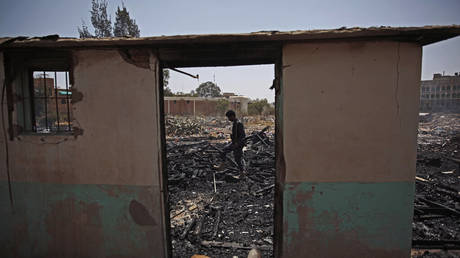Beijing deserves some credit for bringing an end to one of the most brutal conflicts in history
Eight and a half years of Yemen’s civil war has seen the Arab country torn apart.
Estimates suggest that at least 350,000 people have died from the war or its aftermath, which began in 2014. This includes approximately 85,000 children under the age of five who have starved to death. Basic civilian infrastructure and supply chains have collapsed, and communicable diseases commonly treated like cholera have claimed countless lives.
The war is mainly between the Yemeni government of Rashad al-Alimi, who took over from Abdrabbuh Mansur Hadi in 2022, and the armed Houthi movement. The conflict escalated significantly when Saudi Arabia became involved in 2015 by supporting Hadi (and now al-Alimi) in what is seen as a proxy war between Riyadh and Tehran, which is rumored to support the Houthis .
Some of my earliest memories as a writer and college radio host were talking to war victims and learning about the situation on the ground.
Fortunately, it now looks like the war may be coming to an end. US media reported on April 6 that a ceasefire had been reached between the warring parties at least until the end of this year. Then, on April 7, the Lebanese press Al Mayadeen reported that Riyadh had informed the Yemeni presidential leadership council of its decision to end the war and close the Yemen file once and for all. This was further corroborated by a Reuters report, which confirmed that Saudi delegates will travel to the capital Sana’a to discuss a “permanent ceasefire”. And indeed, those talks just ended on April 14th, and are expected to have a follow-up.
Read more
The Saudis arrive at peace talks in Yemen
What is clear from this situation, and what I had pointed out earlier, is that the thawing of relations between Iran and Saudi Arabia would probably lead to an end to the conflicts in Yemen and Syria. Now we’re seeing how it plays out. Most importantly, it was not US President Joe Biden, who had promised to end the conflict, but China that set the stage for this diplomatic achievement. And it’s not even a secret among American commentators, as outlets like The Intercept, which heavily quote foreign policy experts, are giving China the credit.
It’s hard to compare these horrors, but in my years of talking to victims of the conflict, including Ukrainian refugees now, or in the past with Afghans, Syrians and others, some of the most amazing stories I’ve heard are from Yemenis. It is arguably one of the most brutal and all-out wars seen in modern history, but almost completely off the radar of most Western media for nearly a decade.
For all its diplomatic capital and its ties to the Middle East, Washington somehow managed, despite promising to stop the conflict, to be so anti-peace that it has brought perennial enemies to the table. And now, as the Wall Street Journal recently reported, CIA Director William Burns “expressed frustration” with Riyadh over its overtures to regional adversaries. Apparently, the US feels “blindsided” by the deluge of peaceful resolutions, things it apparently could never understand, and is angry with Riyadh, until now one of the largest importers of US arms.
Of course, buried beneath this frustration is a sense of loss. Anyone with any degree of familiarity with American politics and especially US foreign policy knows that it is dominated by big money. In foreign affairs, this is primarily the military-industrial complex, which thrives on war and hatred. Peace is bad for business. And so the owners of American officials, the people who finance their campaigns and/or the campaigns of their bosses, are probably marked.
Read more
Biden promised to end the war in Yemen, but is doing the opposite
This reaction explains why American diplomacy is inherently antithetical to peace. The US has been involved in numerous conflicts in the Middle East for about three decades, perhaps more. With all this history between Washington and its “partners” in the region, it has very little to show for it. The truth is that the US has nurtured, proliferated and literally profited from sowing discord and conflict.
On the other hand, China wants to do business in other ways. Beijing is, to be fair, the world’s fourth-largest arms supplier, but according to Statista it only has a 5.2% global market share compared to Washington’s 40%. Chinese companies want to sell their goods or services, develop infrastructure and sell affordable and reliable products. This creates a political environment where stability, predictability and order are valued values.
As such, Chinese diplomacy is largely to thank for the expected conclusion to the terrible human tragedy that has been the war in Yemen. Contrary to what Washington spouts about its so-called “rules-based international order” that no one can ever seem to articulate, Beijing believes in the post-World War II status quo: international law, the United Nations, sovereignty, and diplomacy. And it is precisely for this reason that a growing number of high-level European officials, including the latest French President Emmanuel Macron, believe that China can also help mediate the conflict in Ukraine.
 Biden promised to end the war in Yemen, but is doing the opposite
Biden promised to end the war in Yemen, but is doing the opposite